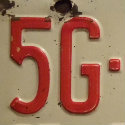
Ren Zhengfei doesn't think 5G is such a big deal.
The Huawei boss told one of his public seminars last week that he thinks the importance of the new standard has been exaggerated. His perspective from the eye of a geopolitical storm may be partisan, but he can't be the only telecom industry exec bemused by the intensity of sentiment over next-generation mobile.
For most of its development over the past decade, 5G has proceeded as unremarkably as the previous technologies, albeit with richer and broader functionality.
Then, two years ago, US officials discovered 5G and rebranded it as a security threat and a hefty advantage to China.
On the security aspect, for sure, the sheer ubiquity of 5G means the number of connections and therefore vulnerabilities are going to expand.
But is that actually new? Every business today is already a hostage to its information infrastructure -- not just Amazon, but Toyota, Citibank and Rio Tinto. They are all utterly dependent on their connectivity. 5G might mean more points of vulnerability, but the idea that this is a novel threat is nonsense.
As for China's advantage, Ren has a view on that, too: He says Huawei backed a winner when it plumped for Erdal Arikan's polar codes as a core 5G technology a decade ago while the US went for LDPC, a.k.a. the Gallagher codes.
In any case, Huawei's dominance in 5G technology has set off a debate about the competitiveness and level of Western and in particular US telecom innovation.
The US today has strong players like Qualcomm and Cisco, but it no longer has a telecom network vendor in the Huawei or Ericsson mold.
One reason is the attitudes of leaders and policy makers over the past two decades. Primarily, there have been two sets of related assumptions.
First: In a globalized economy with a high level of assumed trust, we no longer need national champions. In this mindset, concerns about threats to critical infrastructure could be ignored.
Second: Governments don't need to get involved in industry policy, especially with the US's apparently strong system of innovation.
The China approach, of course, is the opposite. It embraces industry policy and doesn't hesitate to intervene on behalf of its champions. The rigidity of the China system creates its own problems, however: Note how the Japanese IT industry with its own carefully approved winners has frozen in the past two decades.
Want to know more about 5G? Check out our dedicated 5G content channel here on
Light Reading.
But back to the US.
Lumina Networks CEO Andrew Coward has attracted some attention with a thoughtful blog post on the failings of the telco innovation ecosystem.
He notes the resemblance to the minicomputer market of the mid-90s, when the proprietary monopolies were starting to crumble just like those of telecom today.
So telcos are now choosing multiple vendors to avoid lock-in, but this creates a tangle of systems that is hard to orchestrate. The advent of 5G "multiplies the number of radio locations and associated equipment by a factor of ten, moving the management problem from 'challenging' to 'untenable'," Coward writes.
Where does the innovation come from? He notes that venture capitalists (VCs) are wary of the "long sales cycles and the conservative purchasing mentality of telcos." That's letting VCs off lightly. They are risk-averse and severely prone to FOMO (fear of missing out), hence the gallons of cash tipped into Uber and WeWork rather than firms with creative ideas that might drive economic activity.
Coward suggests it's up to telcos themselves to invest in innovation. Prior to deregulation, this is what they did. In return for its monopoly, AT&T gave us the transistor, the satellite, wireless, optical fiber and Unix.
"Telcos really need to place significant bets on the startups that can affect this outcome now and seize control of their own destiny," he writes. He goes on to say that by making these bets telcos can entice VCs to follow them into the market, coming to see 5G "as not a side bet, but a stake in their future network."
In their current financial environment, telcos are reluctant to part with their hard-earned cash, even for potential revenue-earning 5G capabilities. They have also learnt it is difficult for a telco based in a single market to compete effectively against competitors with a global outlook, footprint and funding sources.
So none of this easy. But with the advent of 5G, and its broad canvas of opportunities, telcos and their partners -- whether vendors, governments or even VCs -- are under growing pressure to create vehicles that can fund innovation and generate value. If they don't, they really could miss out.
— Robert Clark, contributing editor, special to Light Reading
About the Author(s)
You May Also Like




_International_Software_Products.jpeg?width=300&auto=webp&quality=80&disable=upscale)







